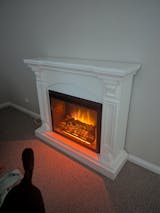When it comes to creating a cosy and welcoming atmosphere in your home, few things are as effective as a fireplace. However, the choice between a gas or electric fireplace can be a challenging decision. Both have their unique advantages and drawbacks, and the best option often depends on your personal needs, preferences, and home setup. In this article, we'll explore the pros and cons of gas and electric fireplaces under five key aspects to help you make an informed decision.
1. Installation and Ease of Use
Electric Fireplaces:
Electric fireplaces are renowned for their ease of installation and use. They simply need to be plugged into a standard electrical outlet, making them a plug-and-play option. You don't need a chimney or vent, which means they can be installed in any room, regardless of the house layout. The ease of use extends to their operation as well – with a remote control, you can easily adjust settings from the comfort of your couch.
Gas Fireplaces:
Gas fireplaces, on the other hand, require a more complex installation process. They need to be connected to a natural gas line, and proper ventilation is a must, which often requires the installation of a vent or chimney. This makes them less versatile in terms of placement within your home.
2. Aesthetics and Ambiance
Electric Fireplaces:
Electric fireplaces have made significant strides in terms of aesthetics. Modern units offer realistic flame effects and even sound modules to mimic the crackling of a real fire. However, some might argue that they still lack the authentic feel of a real flame.
Gas Fireplaces:
Gas fireplaces provide a more traditional aesthetic with real flames. They offer a closer semblance to a wood-burning fireplace, providing both warmth and a classic, inviting ambiance. This can be a significant factor for those who value the traditional fireplace experience.
3. Cost and Maintenance
Electric Fireplaces:
One of the biggest advantages of electric fireplaces is their low operating cost. They are generally more energy-efficient and the cost of electricity is typically lower than gas. Maintenance is also minimal – there are no ashes to clean or chimneys to maintain.
Gas Fireplaces:
Gas fireplaces tend to have a higher operating cost due to the cost of natural gas. However, they can be more efficient in heating a room. In terms of maintenance, they require regular checks to ensure the gas lines and vents are functioning properly, which might incur additional costs.
4. Safety and Health Considerations
Electric Fireplaces:
Electric fireplaces are considered very safe. They don’t produce real flames, which reduces the risk of fires or burns. Additionally, since they don't burn fuel, there are no emissions, making them a healthier choice, particularly for those with respiratory issues.
Gas Fireplaces:
While gas fireplaces are generally safe, they do require careful installation and regular maintenance to prevent gas leaks. They also emit a small amount of combustion gases, which necessitates good ventilation to avoid health hazards.
5. Environmental Impact
Electric Fireplaces:
Electric fireplaces are often seen as more environmentally friendly, especially if your electricity comes from renewable sources. They don’t produce emissions and are highly efficient.
Gas Fireplaces:
Natural gas is a fossil fuel, and burning it produces greenhouse gases. However, compared to wood-burning fireplaces, gas fireplaces are cleaner and emit fewer pollutants.
Choosing between a gas and electric fireplace depends on various factors including ease of installation, aesthetic preferences, cost, safety, health considerations, and environmental impact. Electric fireplaces are ideal for those seeking easy installation, low maintenance, and an environmentally friendly option. Gas fireplaces, meanwhile, are suited for those who prioritise a traditional look and feel, and are willing to invest in installation and maintenance. Ultimately, the best choice will align with your specific needs and values.
















